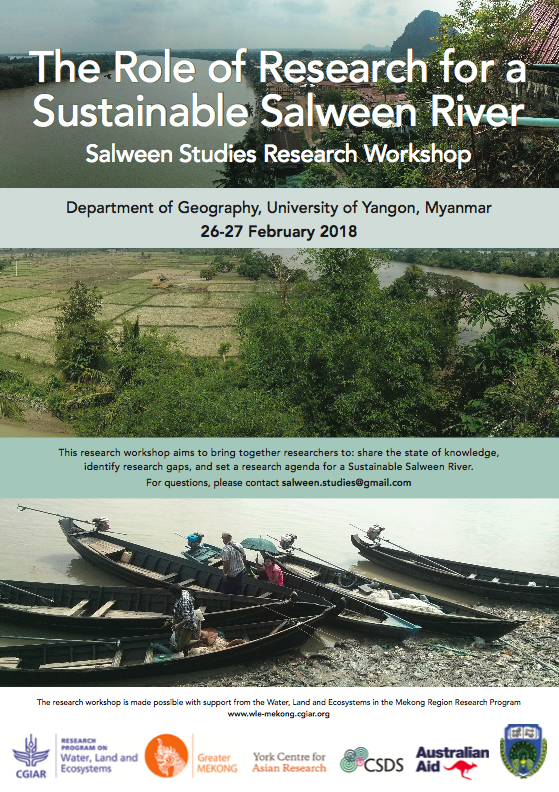CONFERENCE PROCEEDINGS: Salween Studies Research Workshop - The Role of Research for a Sustainable Salween River
/This research workshop on “Salween Thanlwin Nu Studies” (“Salween Studies”) built on the work and momentum of previous Salween Studies meetings (Mawlamyaine 2013, Chiang Mai Experts Meeting 2013, Salween Studies Conference at Chiang Mai University 2014, and Salween University Network Meeting 2016). We brought together researchers to: share the state of knowledge, identity research gaps, and to set a research agenda for a “Sustainable Salween River.” The event was held on 26-27 February 2018 at the Department of Geography, University of Yangon, Myanmar and attended by over 60 participants from around the world.
This research workshop also represented the final meeting of the Salween Water Governance Project and as such, represents the culmination of three years of research and collaboration among the “Salween University Network.” This project was carried out under the CGIAR Research Program on Water, Land and Ecosystems (WLE) in the Greater Mekong with support from CGIAR Fund Donors (http://www.cgiar.org/about-us/ourfunders/) and the Australian Department of Foreign Affairs and Trade (DFAT).
The following were identified as the specific objectives for the conference:
- Share state of knowledge
- Identify research gaps
- Identify research projects going forward
Individual worksop presentations can be downloaded from the links below.
Day 1
Keynote by Professor Maung Maung Aye: A reflection on the role of researchers and research on the Salween River: Past, Present and Future
Panel 1: Pathways approach for change? Towards a Sustainable Salween
- Why think about Salween pathways approach overall? (Carl Middleton)
- From hydropower development to national park conservation: Changing pathways of the Nu River (Chen Xiangxue and Yu Xiaogang)
- Which path to take? A political economy analysis of Salween River pathways in Myanmar (Alec Scott, Carl Middleton and John Bright)
- Salween Pathways and the Role of Thailand (Carl Middleton)
Panel 2 and 4: Physical Geographies of the Thanlwin River and Estuary
- The Morphological Change of Thanlwin River Mouth (Htun Ko)
- Water Quality of Thanlwin and Attaran Rivers (Aye Aye New)
- Study on the Morphological Change of the Ayeyarwady River from Pyay to Hinthada (Aung Swe, Khin Khin Htay, and Kay Thwe Hlaing)
- Investigation on the Physicochemical Properties in the Than Lwin River Water (Aung Nay Win)
Panel 3: Social, Ecological, and Economic Values of the Lower Basin
- Rights and rites for water justice: A case study of the propose Hatgyi Dam on the Salween River (Saw John Bright)
- Traditional Forest Land Management Practices in Southern Shan Highland, Thanlwin River Basin: Selected Indigenous People Group (Min Oo and Saw Win)
- Assessing Potential threats to fisheries and socio-economy in the Thanlwin Estuary, Mon State (Cherry Aung)
Panel 5: Development for whom?
- Not only anti-dam: Rendering complex local communities in their negotiation for development in the Salween Borderlands (Paiboon Hengsuwan)
- Social welfare of Burmese refugees and human security (Naruemon Thabchumpon)
- The global environmental crisis you’ve probably never heard of? Sand, Gravel, and Sediments on the Lower Salween and in a global context (Vanessa Lamb)
Panel 6: Energy Planning for whom?
- The role of community participation in decentralized energy solution in part of Thanlwin River Basin (Kyi Phyo)
- Trans-boundary Rivers and Justice in Relation to the Salween Dams and Thailand's Water Diversion Plans (Pai Deetes)
- The Role of Environmental Impact Assessment in Governance of Nu-Salween River: A Comparative Study of the Chinese and Myanmar Approaches (Yongmin Bian)
Day 2
Keynote by Professor Chayan Vaddhanaphuti: States of knowledge and geographies of ignorance of/in the Salween Basin
Panel 8: Learning from other contexts for the Salween
- Community-based research and the Question of Sustainable Development in the Management of Trans-Boundary Natural Resource Management in Myanmar, case of the Ayeyarwady (Pyi Pyi Thant)
- How understanding river process connections along rivers has influenced policy and management in major rivers (Ian Rutherfurd)
- Transferring Lessons Learned About Environmental Security from the Mekong River to Benefit Salween Studies (Ed Grumbine)
Panel 9: Landscape Change: Linking forest and water governance (session cancelled)
Panel 10: Peace, Conflict, and Salween Water Governance
- Salween Development Plans, Can't go Back home while rising blur Democracy (Saw Tha Phoe)
- Subnational conflict, development and the Salween River (Adam Burke)
- Repositioning the Salween Basin in a Critical History of Burma/Myanmar (Alec Scott and Carl Middleton)
Panel 11: Gender, Environmental Governance, and Development.
- Ecofeminism evolution readiness of gender evolution in the case of Mong Ton Dam project (Nang Shining)
- Gender Inclusion Is Key to Social Justice: A Case Study of Two Villages Downstream of the Proposed Mongton Dam, Shan State (Hnin Wut Lee)
- Forest governance in the Nu-Thanlwin-Salween River basin of the Shan State of Myanmar (Kimberly Roberts)
Panel 12: Politics of Water Governance and Scale
- Salween Movement: Lessons-learnt from local-led responses (Ma Doi Ra)
- Measuring what matters: assessing and weighing socioeconomic, biophysical, and geopolitical impacts from widespread dam development in the Salween watershed (Darrin Magee)
- Redefining the rules of water: Contestation and the production of scale in water governance in Myanmar (Johanna Goetz)
- Analysis on the Impact of Landcover Changes on Socio-economic Conditions of Bawlakhe District (Khin Sandar Aye)
Closing remarks and synthesis: Research and Policy Making on the Salween River: How should they be related? (Khin Maung Lwin)



